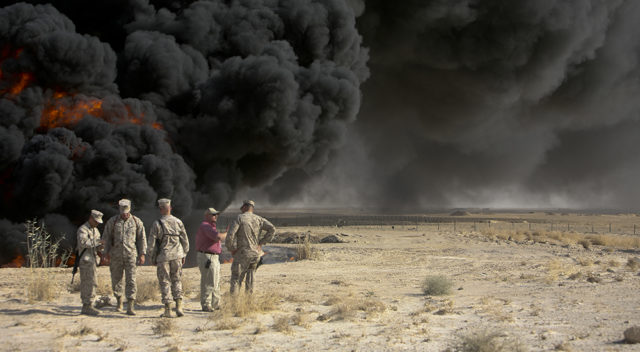
Post-9/11 vets exposed to toxic burn pits would get expanded benefits under Moran bill U.S. Marines with 1st Marine Logistics Group (1st MLG) burn black water. (U.S. Marine Corps photo by Sgt. Jason W. Fudge)
Kansas Sen. Jerry Moran is pushing for legislation that would expand medical benefits for post-9/11 veterans suffering from health problems related to working with toxic burn pits.
A bill he co-sponsored with Montana Sen. Jon Tester was introduced this week and passed through the Senate Veterans Affairs Committee on Wednesday, as Congress tries to chart a path to help an estimated 3.5 million post-9/11 veterans who may have been exposed to toxic burn pits.
The open-air burning of trash and other waste like chemicals, human waste, munitions, petroleum and plastics in pits was common in Iraq, Afghanistan and other parts of Southwest Asia where troops served, according to the Department of Veterans Affairs.
“Post-9/11 veterans are the newest generation of American heroes to suffer from toxic exposures encountered during military service,” Moran said. “The Health Care for Burn Pit Veterans Act is an important first step to make certain our veterans receive the care they need as a result of their service.”
Moran and Tester said their bill is part of a three pronged approach to expand benefits for veterans. It gives those who served after 9/11 an additional five years of health care eligibility after they are discharged and an extra year of open enrollment for people who have been discharged for more than 10 years.
It would also require the VA to establish screening procedures for burn pit exposure and symptoms and establish an outreach program for veterans who might have missed the window for eligibility.
“As more and more veterans report alarming rates of toxic exposure related illnesses, one thing is abundantly clear: without action, post-9/11 veterans will suffer as Vietnam veterans have,” Tester said. “And every year more toxic exposure veterans will pay the ultimate price while waiting for the treatment that they need.”
The Senate bill is a pared down version of an earlier bill introduced in the House of Representatives that would provide benefits to all veterans, not just those who served after 9/11. According to the Congressional Budget Office, the House bill would cost more than $300 billion.
Moran and Tester said the bill they proposed, which they said would cost a little under $1 billion, is the bill that they believe has enough votes to pass the Senate. It had unanimous support from the Veterans Affairs Committee.
The Senate bill is the first in what Moran and Tester described as a set of three measures that will include a new process for the VA to add conditions presumed to have come from exposure (the VA added asthma, rhinitus and sinusitus in May).
Tester said the pared down approach is necessary in order to get the bill through the Senate.
“The goal here is to get this thing done by the end of this Congress,” Tester said. “The question becomes how you get done. And I think this is the best way to get this through the Senate and that’s why we’re proceeding this way.”
While the bill made it out of committee, it will still have to pass the full Senate and the House of Representatives. Because the House Committee of Veterans Affairs already passed a different bill, there will likely be negotiation between the House and the Senate on how to move forward.
“We have ongoing conversations with the Chairman, Ranking Member and members of the committee that will continue,” Moran said. “I would guess that legislation will pass Congress. And it’s the kind of legislation that will be able to be supported in a bipartisan way and signed by the President.”
___
© 2022 McClatchy Washington Bureau
Distributed by Tribune Content Agency, LLC.




